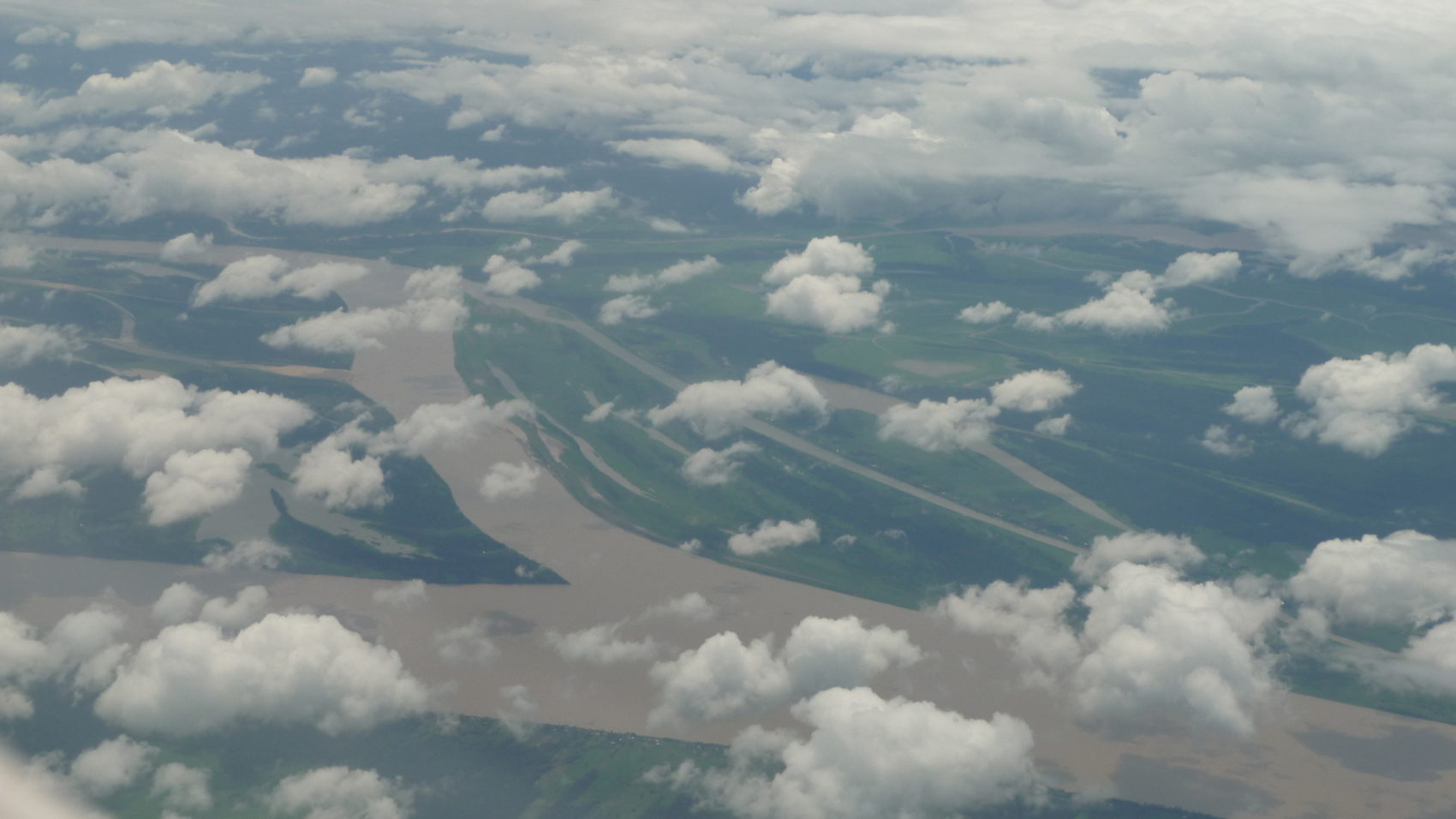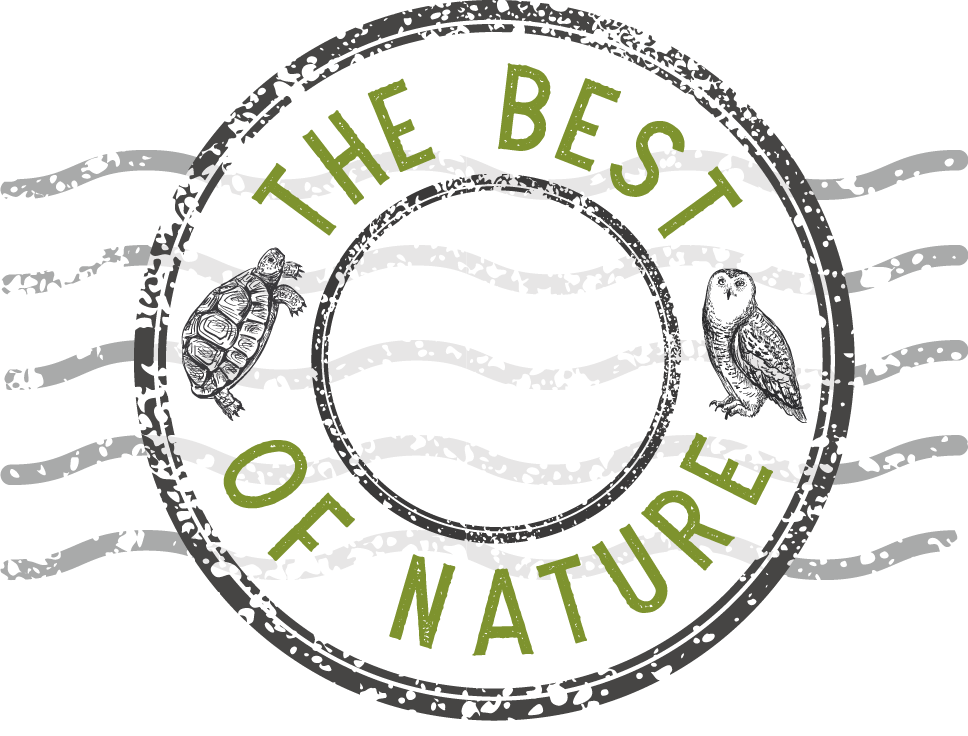www.uakarilodge.com.br
Lodge style
10 rooms
Pousada Uakari, The Amazon - Brazil
WELCOME TO THE AMAZON’S WILDERNESS
Only starlit sky at night
Welcome to the Amazon’s Wilderness, into the Natural Reserve of Mamiraua, North West of Brazil. Definitely a region to get inspiration from, in the energy of Water on a simple though chic floating lodge. Located in the state of Amazonas, between the confluence of the rivers Solimões, Japurá and Auati-Paraná, the reserve takes up 1,124,000 hectares and is home to 10 communities and over 10,000 persons.
1H30 away from small Tefé on a small boat, the Mamiraua reserve was founded by Brazilian primatologist José Márcio Ayres, who came here in the 1980’s to study the uakari monkey, endemic of the area. One of the reserve’s responsibilities was to set up an ecotourism venture as a way to behold the world’s greatest natural ecosystem while contributing locally to a better life. Pousada Uakari was born, almost a 20 year-old-story generating income for the local people (the communities take turns managing the Lodge) while today, researchers see the environmental impacts nearly neutral and the social and economic development life-changing for the Caboclos Indians.
In one of the poorest regions in Brazil, Pousada Uakari is set as an example of a Natural Lifestyle shared between the inhabitants, the travellers and Nature itself.
Contact.
Rua Quintino Bocaiúva n° 414, Centro – 3° Floor
69550-013 Tefé – Amazonas – BRAZIL
T. +55 97 3343 4160 / 9750
EMAIL : ecoturismo@mamiraua.org.br
A FLOODED FOREST NATURE RESERVE
Mamirauá Sustainable Development Reserve is made up of the biggest protected flooded forest in the world (called várzea). Only 4% of Brazilian Amazon consists of freshwater swamp forest and Mamirauá Reserve plays an important role to protect this ecosystem. As such, it is inserted in the Central Amazon Corridor and is part of the Amazon Biosphere Reserve.
Besides, it’s a recognized Brazilian reserve by Ramsar Convention, that protects wetlands of great importance. Every year the reserve goes through high and low water levels. The variation among the crest of these two stages is up to 12 meters. The flood variation, the geological history and geography of the place give Mamirauá high levels of endemism and particular species, to start with the iconic white uakari with red head.
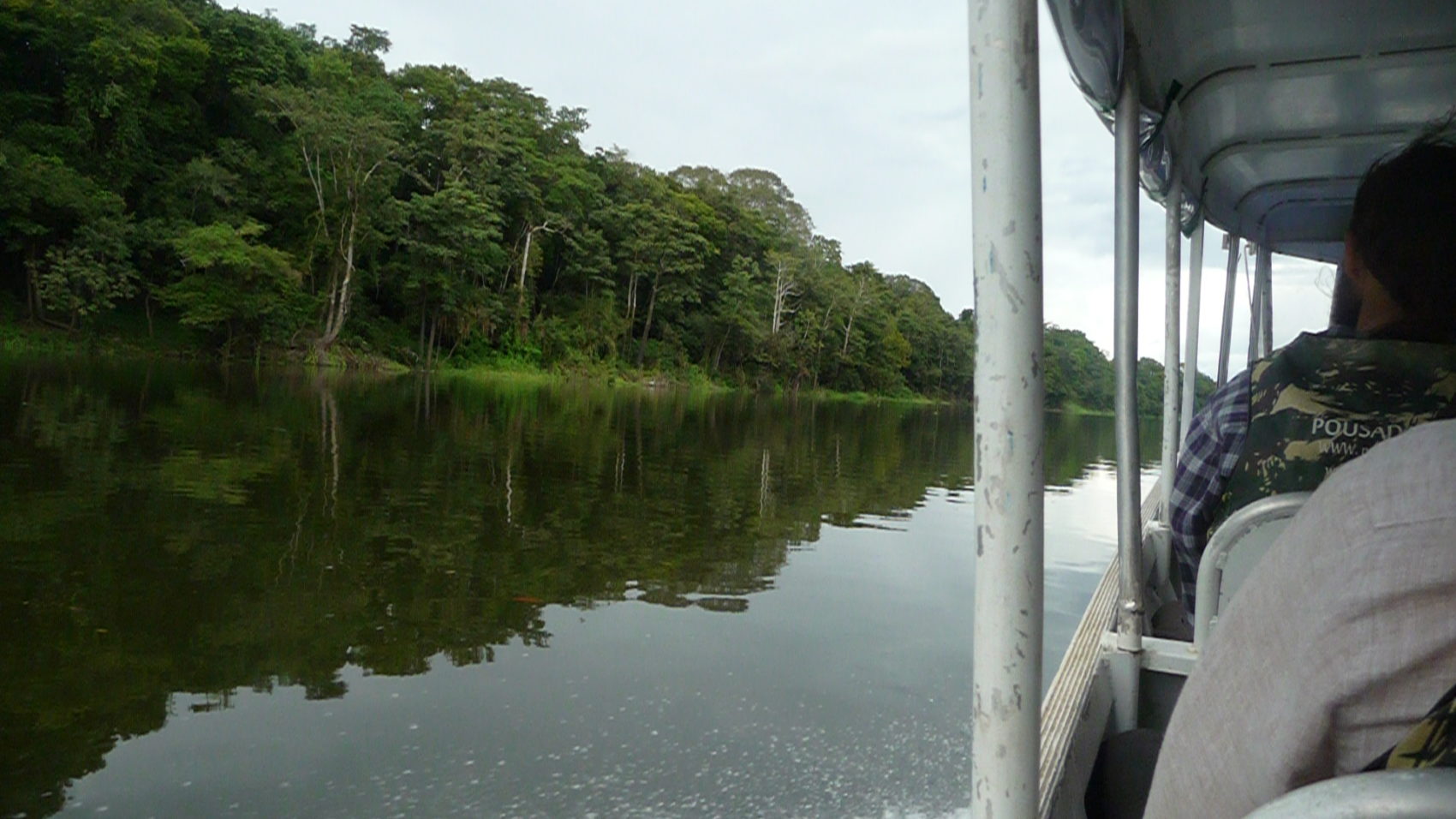
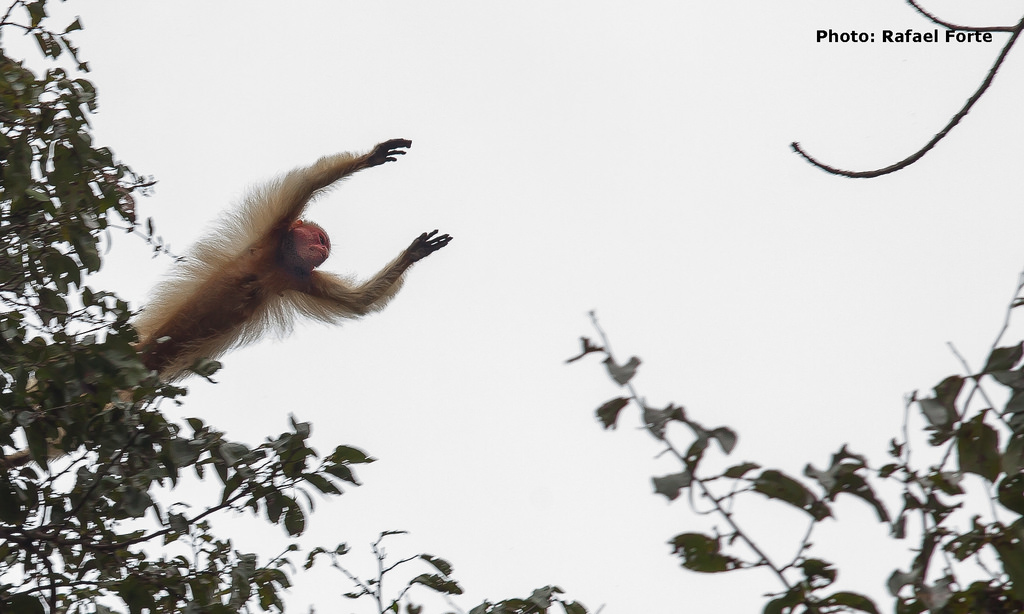
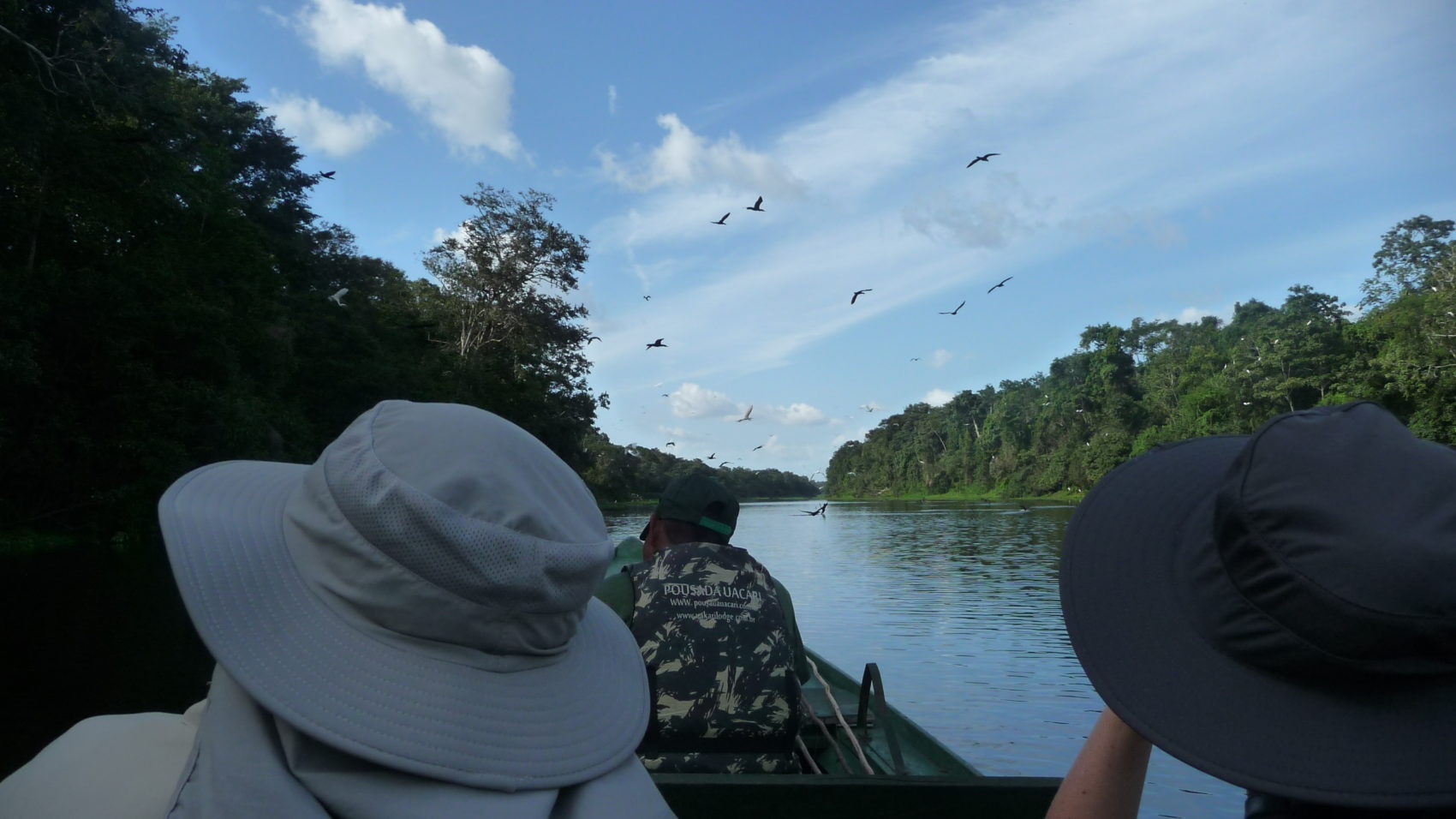
THE LODGE THROUGH A PURE NATURE D(ECO)RATION
« Less is more » perfectly applies to the Pousada harmoniously floating on one of the confluents of Amazon. Rooms are all made of wood and open onto a wood terrace overlooking the forest. If you would like to start observing like a Caboclo, watching away the slightest movement of the branches to hopefully notice a sloth, you’ll have a front row seat from a hammock, jacarés (those big caimans) being your nearest neighbours.
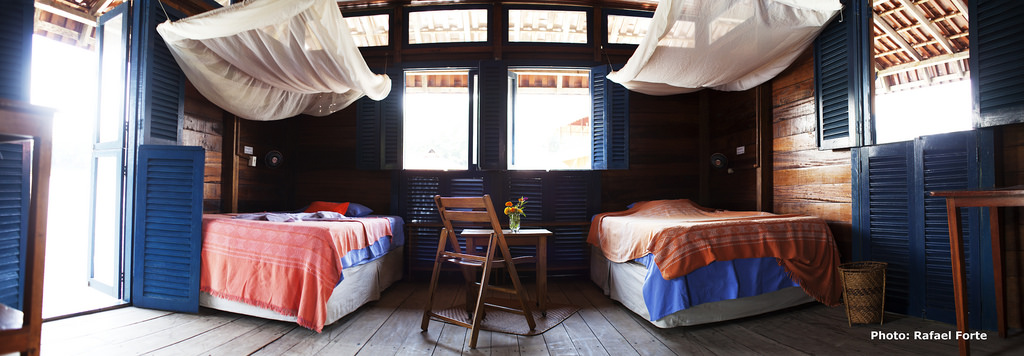
At the restaurant, simplicity also applies, still with this same harmonious blend of wood, a naturalist naive painting welcoming you on the entrance wall while the place is also home to beautiful exchanges with scientists around the small coffee table. A bar, a video room and a library connect to the restaurant offering a long table where to share meals.
Pousada Uakari used to host a pool directly immersed into the Amazon but it seemed to be tricky with pirarucus big fish willing to join the swim! Nowadays, the IN/OUTdoor philosophy easily replaces the idea of a Spa in its wellness dimension.

SLOWFOOD & THE AMAZON
Brazil is known for its feijoada, a stew of beans of Portuguese origin cooked with beef and pork and most commonly served with white rice, as well as for its churrascarrias, these restaurants offering a symphony of grilled meat.
Now, the Amazon is quite a myth apart from civilization and a place where to enjoy unexpected fruits and vegetables, in an almost botanical approach. A wonderful opportunity to play explorer by discovering the jambu leaves as well as the cupuaçu, açai and other fruits served as juice on the table. Fish and chicken are part of the daily buffets and, should you be a good fisherman (you’ll be provided a piranha fishing session), you may taste this specie with sharp teeth. For dessert, you’ll enjoy tasting brigadeiro, a delicious chocolate Fudge truffle.
AN ECO SENSITIVE LODGE…
In the 5 bungalow-floating lodge (each with two rooms) able to welcome up to 20 guests, the facilities can only be sustainable and this is Ultimate Luxury. The energy comes from the sun with solar pannels while the tiles are ecological, made of recycled PET from plastic bottles. The rain is collected and kept and effluents treated before coming back to the river.
Pousada Uakari’s eco-credentials are pretty impressive. Only managed trees were used in the construction. Twenty years later, local communities still take part in the way it is run and get a share of the profits. A great way to combine sustainable development with a focus, through ecotourism, on the biodiversity of the várzea and openness to a natural lifestyle, as simple as joyful and serene.
FOR AN ECO SENSITIVE EXPERIENCE…
Stay from 3 to 7 nights and get to know know the different habitats that freshwater swamp forests offer while walking in the forest at day time or night (great moment to observe spiders and insects on trees whose grandeur gets amplified in the night). You may as well enjoy the sunset from a boat and come back looking for animals at night with motor canoe, to start with jacarés to be spotted from the red eyes.
Meeting a riverine community is a special moment to learn about local people life and relationship to Nature. In the evening, lectures are given by naturalist guides and researchers for an even deeper understanding. Willing to take part in a scientific expedition with the jaguars of the Amazon or a birdwatching immersion tour ? Botos, pink river dolphins, are among these exciting observations.
Note the rainy season starts in December and from April to June, the water is high and all activities involve boats or canoes, including the visits to the communities whose houses remains dry thanks to stilts. It makes it easier to watch monkeys and sloths coming out of the woods to the edge in search of “Munguba” flowers, an eccentric tree.
From August to November it is the dry season offering a higher concentration of fish – time to wake up to the sound of pirarucus hitting the tail against the low water – and birds. A great period to go hiking.
TAKE HEIGHT & FLY OVER…
If you should fly from Manaus to Tefé, you’ll have the opportunity to watch the Amazon and the deep forest from the air. A wonderful moment if not too cloudy… while surprisingly gazing at small houses that look unreachable with a car. Some are only by boat and that’s part of the Amazon myth.
